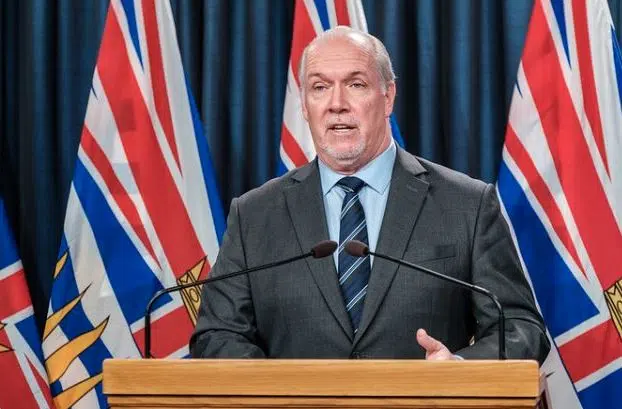
There continues to be calls from around the province asking the BC Government to declare a provincial state of emergency in light of the 300-plus wildfires currently burning.
However, speaking to media today, Premier John Horgan says that is still not the recommendation at the moment from the BC Wildfire Service or Emergency Management BC.
“I’m absolutely prepared to call a state of emergency when it is required by those professionals that are putting their lives on the line to protect families and property in British Columbia,” he said. “I appreciate the enthusiasm of the Official Opposition but again, I think most British Columbians would prefer that I listen to the people and that’s exactly what we intend to do.”
“In 2017, it was Todd Stone from Kamloops, who was the minister at the time, who declared a state of emergency, not because the opposition called for it, but because he got advice from the Wildfire Service and Emergency Management BC that that was the time. Similarly, in 2018, we followed suit.”
Most of the fires in B.C. are burning in the Kamloops Fire Centre, with 108 at last count. There are also 28 ‘wildfires of note’ in the province – fires are highly visible or pose a threat to public safety.
Horgan says there would be no advantage in calling a provincial state of emergency right now as such a declaration would have no impact on the resources already here.
“There is not one advantage at all from calling a state of emergency except to bring more people together,” Horgan said. “We already have full participation from the federal government with some 500 military personnel as well as equipment.”
“We’re working with the private sector in areas of concern where fires are underway. We have significant challenges [but] we have the resources to manage that to the best of our ability.”
In an update on Thursday afternoon, Brendan Ralfs, the Director of Response, with Emergency Management BC, said a state of emergency is a legislative tool.
“During this current event, a provincial declaration of a state of emergency has not been necessary to provide assistance to people, to access funding, or to coordinate or obtain additional resources, including federal assets, to support both the response efforts and people who are affected or impacted by the event,” Ralfs said.
“The province is currently deploying all necessary and requested resources to respond to wildfires across B.C., and the federal government and the Canadian Interagency Forest Fire Centre have been engaged and they are providing firefighting personnel, aircraft, support and other assets.”
However, at that same press conference, the BC Wildfire Service said its resources are so stretched thin that crews are focusing their efforts on fires that threaten life and structures.
“We have a whole group of people in our organization who are reaching out to our international partners and across Canada because we will take the trained resources, as many as they’re willing to send us, we’ll take them now because we know this is going to be a long season,” said Rob Schwietzer, the Director of fire centre operations with the BC Wildfire Service.
“We’re not turning away anybody who’s coming to us that has that background [in knowledge of the land or retired wildfire personnel in support roles]. We’re not, at this time, hiring people off the street or emergency firefighters, we’re not at that stage yet.”
In addition to the 2,500 B.C. personnel involved in the province’s fire fight, there are 118 people from Quebec, New Brunswick, Newfoundland, Alberta, Manitoba, Nova Scotia, and Parks Canada helping out as well.
“Mexican firefighters who are in transit should be here in the next number of days,” Horgan said. “We are putting all hands of deck, and the state of emergency is not required to do that.”
Horgan also says there are local states of emergency in place in areas of the province where the fires are persistent. In the Thompson-Nicola Regional District alone, there are six local states of emergency, with 13 per cent of regional district on evacuation order or alert.
Board Chair Ken Gillis is asking other regional districts impacted by the wildfires to make similar requests to the province because of the threat in the Interior.
“There are fires burning out of control in the Columbia-Shuswap Regional District, there are fires out of control in the Cariboo Regional District, and there are fires out of control in Squamish-Lillooet,” he told NL News.
“There are also fires out of control in the Prince George area and there’s no prospect whatsoever of any relief from the weather.”














